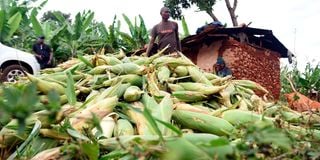Premium
State scraps lower limits on strategic food reserves amid high inflows

A man standing next to a heap of harvested maize at Gatitika in Kirinyaga County on July 5, 2023.
What you need to know:
- The government has in recent months opened wider windows for duty-free imports of key food items such as rice, maize, and sugar to curb shortages locally.
- President Ruto revealed at the weekend that the government would ship in duty-free consignments of yellow maize to help deal with skyrocketing costs of animal feeds.
The government has removed the lower limit of food rations to be held in National Strategic Reserve (NSR), an indication that stocks could be ramped up significantly through ongoing duty-free imports, and a mop-up of produce held by local farmers.
New regulations published by Agriculture and Livestock Development Cabinet Secretary Mithika Linturi said NSR stocks will now be determined by prevailing market demand and supply conditions.
“The quantity of the stock referred to in sub-regulation (1)(b) shall be determined by the committee based on the prevailing market demand and supply conditions as communicated to the Board (NSR Board),” said the CS in the rules.
Regulations published earlier by the ministry on February 22, 2023, had set the minimum stock held in the NSR at 90,000 tonnes or three months' national food requirement of scheduled agricultural produce.
“The National Cereals and Produce Board (National Strategic Reserve) Regulations, 2023 are revoked,” Mr Linturi said about the earlier regulations published in February.
The move by the State indicates that it is keen on increasing the size of stock held in the NSR both through importation and harvests by local farmers.
Food shortage
The government has in recent months opened wider windows for duty-free imports of key food items such as rice, maize, and sugar to curb shortages locally.
For example, in a rush to use the duty-free importation window opened by President William Ruto’s government, traders imported 701,743 tonnes of cheaper rice in the first half of this year, according to the official data by the Kenya National Bureau of Statistics.
President Ruto revealed at the weekend that the government would ship in duty-free consignments of yellow maize to help deal with skyrocketing costs of animal feeds.
The duty-free imports have, however, triggered disquiet among some farmers amid concern that they could distort prices and hinder the purchase of their produce in the domestic market especially during ongoing harvests.
Besides the imports, the Agriculture ministry is expecting a larger supply of maize from the ended crop season.
Fertiliser subsidy
The government projects maize harvests of over 40 million bags in the current harvesting season, boosted by sufficient rainfall during the long-rain planting season and a State-backed fertiliser subsidy programme.
Data from the Kenya National Bureau of Statistics (KNBS) shows the country harvested only 34.3 million bags of maize in 2022, a significant drop from 36.7 million bags in the previous year.
It was the lowest yield in over five years driven by a biting drought that ravaged the country for months and a sharp increase in the cost of inputs, especially fertiliser and fuel.
Maize production has dropped steadily in recent years driven by drought, land subdivision, poor quality of fertiliser, land overuse, and high cost of inputs with production reducing from a high of 44.6 million bags in 2018 to just 34.3 million in 2022.
The new regulations by the Agriculture Ministry said the strategic reserve will comprise key food items including; maize, rice, wheat, dried cassava, beans, green grams, Irish potatoes, and powdered milk.
Other items to be stocked in the reserve are canned meat, dried fish, pulses, and other Cereals including sorghum and millet.





